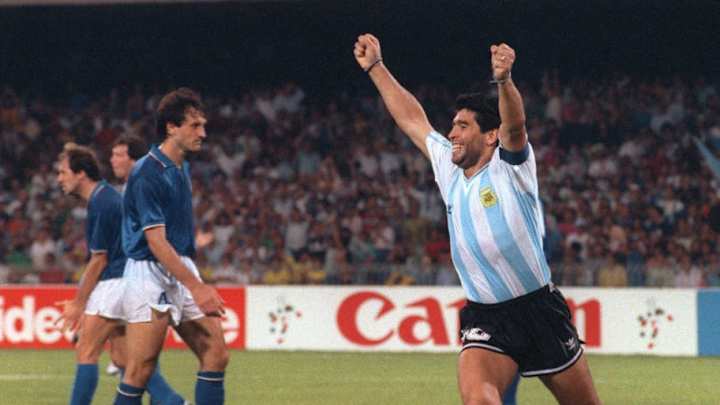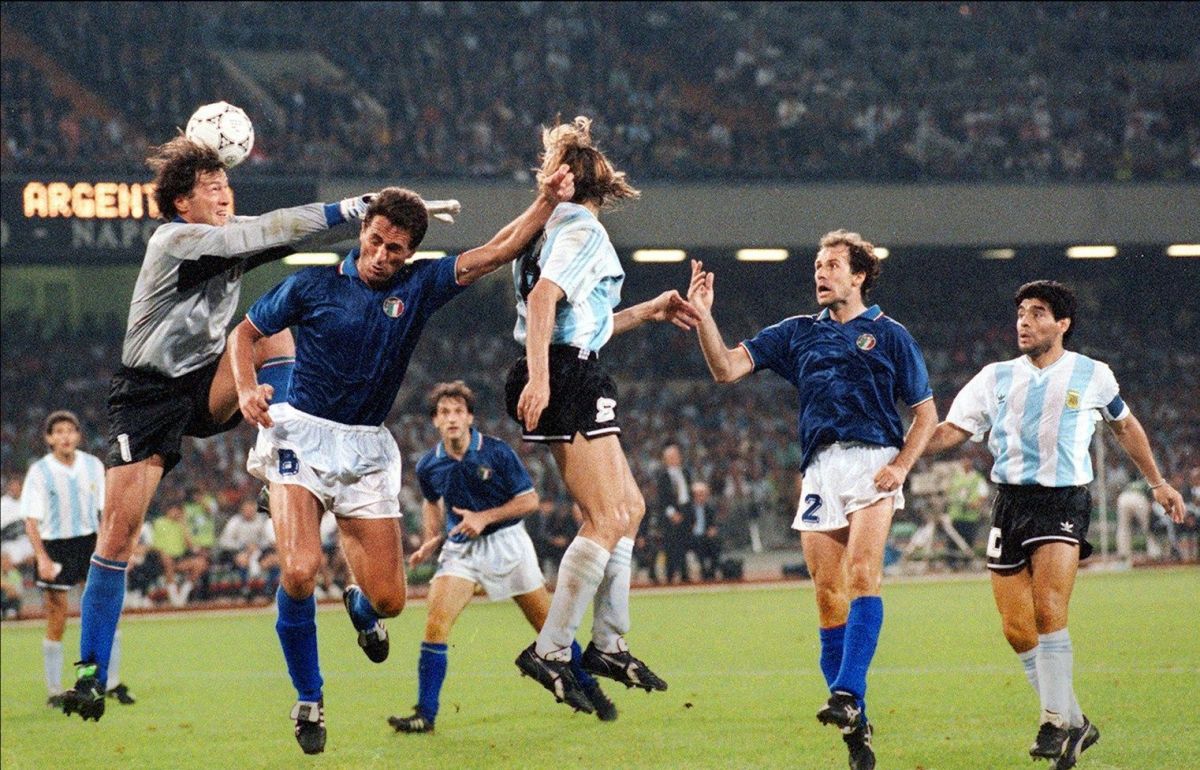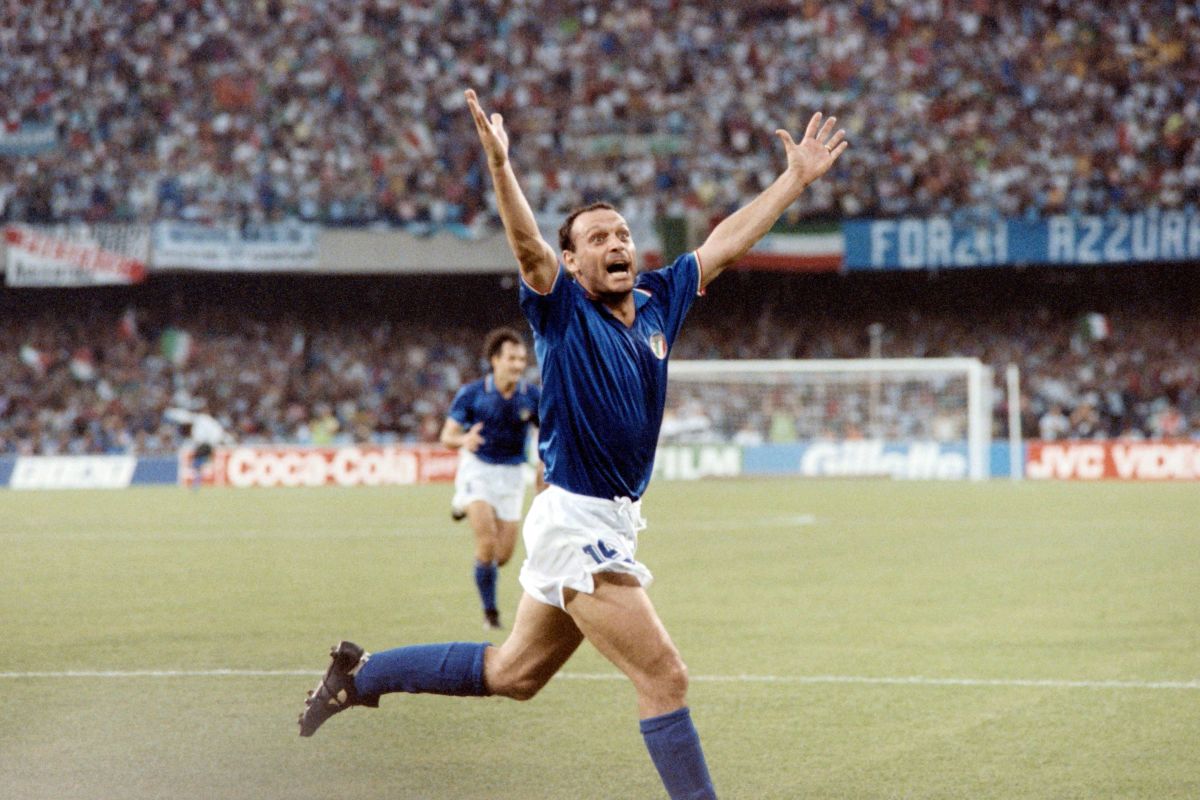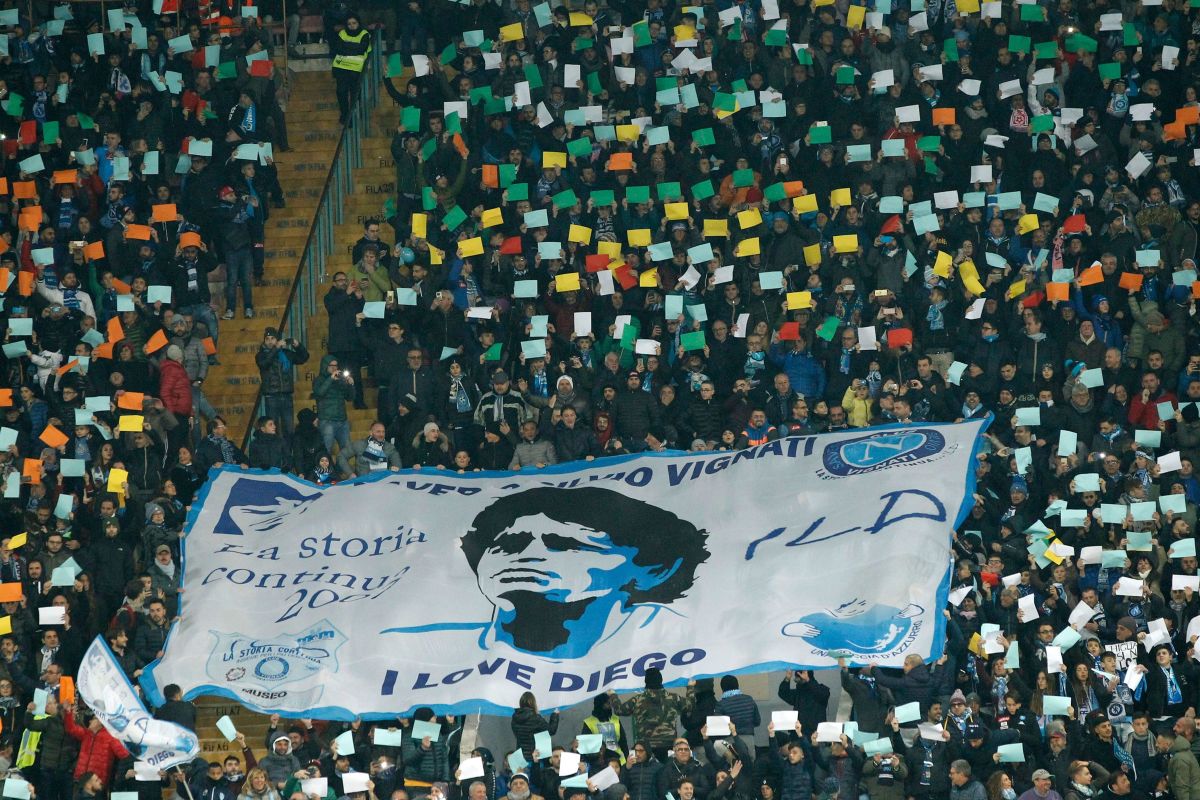World Cup Countdown: 7 Weeks to Go - When Maradona Turned Naples Against the Italian National Team

In his 2005 autobiography 'El Diego', Maradona wrote of his entrance into the Stadio San Paolo for Argentina's semi final with host nation Italy: "When I stepped out onto the pitch, on July 3, the first thing I heard was applause. I read all the banners: 'Diego in our hearts, Italy in our songs'; 'Maradona, Naples loves you but Italy is our homeland'."
Though the Argentinian had already established his God-like status within Naples by dragging them to two Serie A titles in 1986-87 and 1989-90, by the semi finals of Italia '90 he still deemed it necessary to remind 'his people' of this love.
Whilst doing so, and in a more Machiavellian move, the forward also tapped into the everlasting discord between the North and the South of Italy, to inject some political fire into the pre-match discourse. As the number 10 knew, there are few issues more readily exploitable than that age old geographical, ideological and economical division.

Up until the semi final stage, Italy had played all their games at the Stadio Olimpico in Rome, and had clearly grown accustomed to their surroundings - they had won every game they had played, without conceding a goal.
Adding to the pre-existing regional differences, was the notion of Northern favouritism within Italy's World Cup squad. Despite Napoli's title win just weeks earlier, the team was dominated by stars from Milan, Inter and Juventus - a trifecta of Northern powerhouses.
To emphasise this, the club's only representative in the Gli Azzurri's starting lineup for the semi final was a certain Fernando de Napoli.
Speaking in this pre-match press conference, as quoted in his Autobiography, Maradona declared: "I don't like the fact that now everyone is asking the Neapolitans to be Italian and to support their national team. Naples has always been marginalised by the rest of Italy. It is a city that suffers the most unfair racism."
"For 364 days out of the year, you [Neapolitans] are considered to be foreigners in your own country: today you must do what they want by supporting the national team. Instead, I am a Neapolitan for 365 days out of the year."
Igniting all of the region's insecurities and infatuations in one swift motion, the then 29-year-old was responding to the comments made by the politician Antonio Matarrese, as he called for the city to rally around the Azzurri in the face of their club Deity.
By the time the match was underway, the Neapolitans' psyche had been well and truly discombobulated, and they chose to accept both sides in their own way - resulting in the aforementioned banners.
Indeed, Maradona wrote: "The Argentinian national anthem, for the first time in the whole World Cup, was applauded from beginning to end. For me that was already a victory. I was moved: these were my people."
Even though the Albiceleste had had a far less promising campaign - notoriously losing to Cameroon in their opener as reigning champions and only just scraping past Yugoslavia by way of penalties in the quarters - the newfound Naples factor ensured clean slates for both sides.
Diego Maradona psychs himself up for extra-time in Argentina's World Cup semi v Italy, 1990. pic.twitter.com/DXFak46NPK
— Beyond The Last Man (@BeyondTLM) March 31, 2015
With the Italian's form becoming obsolete, the same thing happened to their entertaining (and therefore unusual for this World Cup) style of play. Capitalising on the Maradona paradox, the Argentinians brought their opponents down to their level, suppressing their free flowing spirit - to an extent.
After all, the game's opening goal, from eventual Golden Boot winner Salvatore Schillaci, came from a move that touched on all of their effervescence. It was Schillaci that started the move with some dazzling footwork before clipping it off into the midfield and continuing his dash into the box.
After a few dextrous aerial flicks and nods, Vialli's volleyed effort was parried right into the path of (surprise, surprise) the onrushing Toto, whose finish was never in doubt, regardless of its clumsiness.

However, utilising all their verve and endeavour - although this time not the ethereal skills of their talisman - the Argentinians levelled in the 67th minute, through a header from Claudio Caniggia. To be fair, Diego could claim some credit, in the sense that it was he who had implored coach
Carlos Bilardo to play the winger.
With both sides cancelling each other out and chances at a premium, penalties always seemed the likeliest outcome. The first three takers from each team converted their spot kicks with impressive composure.
Then Roberto Donadoni stepped up, and fired his effort tamely to the right for Sergio Goycoechea to easily block, before theatrically falling to his knees in despair. His despondency was well founded - not only had he recorded the first miss, he had also handed you know who the chance to give Argentina the all important shootout lead.
Maradona ambled to the box, his confidence seemingly unerring despite his failure in the previous round against Yugoslavia. On that occasion, his nonchalance got the better of him, as his strike was easily saved to the left.
With the emotions of the crowd at breaking point, Maradona started his run up. Approaching the ball with far more intent this time, he outwitted Zenga with his pace before sliding it calmly along the ground - and into the gaping left hand corner vacated by the keeper.
This left Aldo Serena with the weight of a nation, a load admittedly slightly lessened by the prior hesitancy of a certain region. Nevertheless, the pressure was on. Bereft of the kind of technique and composure the man before him had shown, he opted for brute force.

It failed. His left footed belter was stopped emphatically by Goycoechea's midrift, earning the keeper a place alongside Maradona and Caniggia as the key protagonists in their country's victory.
As the 26-year-old scampered up to celebrate with the rest of his teammates in the centre circle, the cameras panned once again to Maradona in ecstasy at the Stadio San Paolo. While there would be no Neapolitan fireworks that night, even in defeat the love for their icon still burned as brightly as ever.
